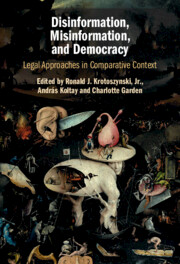
-
Select format
-
- Publisher:
- Cambridge University Press
- Publication date:
- Invalid date
- January 2025
- ISBN:
- 9781009373289
- Creative Commons:
-
This content is Open Access and distributed under the terms of the Creative Commons Attribution licence CC-BY-NC 4.0.
https://creativecommons.org/creativelicenses - Dimensions:
- (229 x 152 mm)
- Weight & Pages:
- 0.76kg, 430 Pages
- Dimensions:
- Weight & Pages:
Open AccessYou have access to this book
Book description
In today's digital age, the spread of dis- and misinformation across traditional and social media poses a significant threat to democracy. Yet repressing political speech in the name of truth can also undermine democratic values. This volume brings together prominent legal scholars from democracies worldwide to explore and evaluate different regulatory approaches for addressing this complex problem – all taking into account that the cure must not be worse than the disease. Using a comparative lens, the book offers important and novel insights into methods ranging from national regulation of politicians' speech to empowering civil-society groups that are well-positioned to blunt the effects of disinformation and misinformation. The book also provides solutions-oriented recommendations for policymakers, judges, legal practitioners, and scholars seeking to promote democratic values by encouraging free political speech while combatting disinformation and misinformation. This title is also available as Open Access on Cambridge Core.
Contents
Full book PDF-
Disinformation, Misinformation, and Democracy
pp i-ii -
-
- You have access
- Open access
- HTML
- Export citation
-
-
Copyright page
pp iv-iv -
-
- You have access
- Open access
- HTML
- Export citation
-
-
Contents
pp v-vi -
-
- You have access
- Open access
- HTML
- Export citation
-
-
Notes on Contributors
pp vii-x -
-
- You have access
- Open access
- HTML
- Export citation
-
-
Preface
pp xi-xiv -
-
- You have access
- Open access
- HTML
- Export citation
-
-
Acknowledgments
pp xv-xvi -
-
- You have access
- Open access
- HTML
- Export citation
-
-
Part I - Theoretical Approaches to the Disinformation Problem
pp 35-74 -
-
- You have access
- Open access
- HTML
- Export citation
-
-
2 - The Internet, Democracy, and Misinformation
pp 37-49 -
-
-
- You have access
- Open access
- HTML
- Export citation
-
-
3 - Democratic Freedom of Expression and Disinformation
pp 50-74 -
-
-
- You have access
- Open access
- HTML
- Export citation
-
-
Part II - The Case of Government Disinformation
pp 75-130 -
-
- You have access
- Open access
- HTML
- Export citation
-
-
4 - Communication of State Authorities
pp 77-114 - The Power of the Office
-
-
-
- You have access
- Open access
- HTML
- Export citation
-
-
Part III - Regional Regulatory Approach to Disinformation: Europe
pp 131-196 -
-
- You have access
- Open access
- HTML
- Export citation
-
-
6 - Freedom of Expression and the Regulation of Disinformation in the European Union
pp 133-160 -
-
-
- You have access
- Open access
- HTML
- Export citation
-
-
Part IV - National Approaches to Disinformation
pp 197-342 -
-
- You have access
- Open access
- HTML
- Export citation
-
-
8 - The Perils of Fundraising Using the Disinformation of the Big Lie
pp 199-221 -
-
-
- You have access
- Open access
- HTML
- Export citation
-
-
9 - Fake News under Siege
pp 222-241 - A Century of Regulation in Chile
-
-
-
- You have access
- Open access
- HTML
- Export citation
-
-
10 - The Battle against Disinformation
pp 242-257 - Legislative Challenges in South Korea
-
-
-
- You have access
- Open access
- HTML
- Export citation
-
-
11 - Disinformation, Misinformation and Democracy
pp 258-269 - An Indian Constitutional Perspective
-
-
-
- You have access
- Open access
- HTML
- Export citation
-
-
12 - Disinformation and Democracy in Africa and South Africa
pp 270-310 -
-
-
- You have access
- Open access
- HTML
- Export citation
-
-
Part V - Civil Society and Tackling Disinformation
pp 343-344 -
-
- You have access
- Open access
- HTML
- Export citation
-
-
14 - Knowledge Institutions and Resisting ‘Truth Decay’
pp 345-374 -
-
-
- You have access
- Open access
- HTML
- Export citation
-
-
15 - Freeing Speech at Work
pp 375-398 - Journalists’ Unions, Workplace Democracy and Political Democracy
-
-
-
- You have access
- Open access
- HTML
- Export citation
-
-
Afterword
pp 399-414 - For Whose Benefit Is the Freedom of Speech?
-
-
-
- You have access
- Open access
- HTML
- Export citation
-
Metrics
Altmetric attention score
Full text views
Full text views help Loading metrics...
Loading metrics...
* Views captured on Cambridge Core between #date#. This data will be updated every 24 hours.
Usage data cannot currently be displayed.
Accessibility standard: Unknown
Why this information is here
This section outlines the accessibility features of this content - including support for screen readers, full keyboard navigation and high-contrast display options. This may not be relevant for you.
Accessibility Information
Accessibility compliance for the PDF of this book is currently unknown and may be updated in the future.


